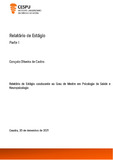| dc.contributor.advisor | ALMEIDA, VERA MARGARIDA SEABRA DE | |
| dc.contributor.author | Castro, Gonçalo Oliveira de | |
| dc.date.accessioned | 2022-06-07T15:07:47Z | |
| dc.date.available | 2022-06-07T15:07:47Z | |
| dc.date.issued | 2022 | |
| dc.identifier.uri | http://hdl.handle.net/20.500.11816/3907 | |
| dc.description.abstract | Introdução: A vivência passada de eventos traumáticos, assim entendidos pelo Manual de Diagnóstico e estatística da saúde mental, pode conduzir a uma sintomatologia pós-traumática, como é o caso da re-experimentação, a evitação e a ativação, e a um aumento exponencial dos níveis basais de ansiedade e depressão. Assim, é objetivo geral do estudo compreender se os valores da depressão, ansiedade, aceitação da doença e eventos traumáticos variavam de acordo com as características sociodemográficas e clínicas da amostra em estudo.
Materiais e Métodos: A amostra referente ao grupo clínico foi recolhida no CGPP-IMBC (Centro de Genética Preditiva e Preventiva - Instituto de Biologia Molecular e Celular) que pertence ao i3S-Instituto de Investigação e Inovação em Saúde da Universidade do Porto com pacientes do Centro Hospitalar do Porto (Hospital de Santo António). Fazem parte desta amostra 32 indivíduos.
Resultados: De acordo com as análises estatísticas realizadas não se obteve qualquer resultado estatisticamente significativo.
Discussão: Face ao tamanho reduzido da amostra e, por consequência, o reduzido número ferramentas suscetíveis de análise, não é possível aferir que as hipóteses em epígrafe foram confirmadas. O referido reduzido número de indivíduos participantes neste estudo justifica-se pelas contingências impostas motivadas pela pandemia. | pt_PT |
| dc.description.abstract | Introduction: The past experience of traumatic events, as understood by the Diagnostic and Statistical Manual of Mental Health, can lead to post-traumatic symptoms, such as re-experimentation, avoidance and activation, and an exponential increase in levels baselines of anxiety and depression. Thus, the general objective of the study is to understand the values of depression, anxiety, acceptance of the disease and traumatic events that varied according to the sociodemographic and clinical characteristics of the study sample.
Materials and Methods: The sample referring to the clinical group was collected at the CGPP-IMBC (Centre for Predictive and Preventive Genetics - Institute of Molecular and Cell Biology) which belongs to the i3S-Institute for Research and Innovation in Health of the University of Porto with patients from Porto Hospital Center (Hospital de Santo António). Are part of this sample 32 belonging.
Results: According to the statistical statistical analyses, no statistically significant results were obtained.
Discussion: Given the small sample size and, consequently, the small number of tools that can be analyzed, it is not possible to verify that the above hypotheses were confirmed. The mentioned small number of participants in this study is justified by the imposed contingencies caused by the pandemic. | pt_PT |
| dc.language.iso | por | pt_PT |
| dc.rights | info:eu-repo/semantics/openAccess | pt_PT |
| dc.subject | Eventos traumáticos | pt_PT |
| dc.subject | Cefaleias | pt_PT |
| dc.subject | Somatização | pt_PT |
| dc.subject | Dor | pt_PT |
| dc.title | Eventos traumáticos e sintomas de somatização na disfunção temporomandibular | pt_PT |
| dc.type | info:eu-repo/semantics/masterThesis | pt_PT |
| dc.identifier.tid | 203019741 | pt_PT |
| thesis.degree.name | Mestrado em Psicologia da Saúde e Neuropsicologia | pt_PT |


